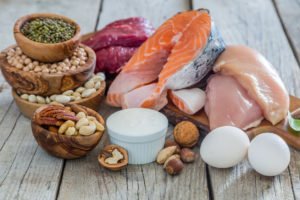New Zealand researchers say older men need more than the recommended daily intake of protein in order to maintain muscle size and strength.
 A study led by Dr Cameron Mitchell at the University of Auckland’s Liggins Institute tracked 30 men aged over 70 for ten weeks. They were randomly assigned to two groups – the minimum recommended daily intake of protein, or double that intake – and meals were provided to the men to keep them on their assigned diet.
A study led by Dr Cameron Mitchell at the University of Auckland’s Liggins Institute tracked 30 men aged over 70 for ten weeks. They were randomly assigned to two groups – the minimum recommended daily intake of protein, or double that intake – and meals were provided to the men to keep them on their assigned diet.
After ten weeks, the men whose protein was at the recommended intake lost muscle size and strength, while those on the higher intake stayed the same size but increased in power input. The researchers suggest the current World Health Organization protein requirements are insufficient to maintain strength or muscle size in men aged over 70.
The SMC asked an expert in gerontology nutrition to comment on the study.
Associate Professor Carol Wham, School of Sport, Exercise and Nutrition, Massey University, comments:
“Expert groups have for some years recommended protein intakes of ≥1.0-1.2 g/kg/d in healthy older adults to preserve muscle mass. This study clearly demonstrated that men who reduced their habitual consumption of protein from 1.2 g/kg/d to meet the WHO RDA of 0.8 g/kg/d experienced a loss of appendicular lean mass. Conversely in men who consumed twice the RDA (1.6 g/kg/d) lean body mass and leg power increased.
“The strength of this trial was that participants were randomly assigned to one of the protein consumption groups and ate foods as part of a controlled diet (30% fat) over a ten-week period. Protein was more evenly distributed across meals in the controlled versus the habitual diets; as noted by the researchers this may have somewhat mediated the changes in lean body mass. Long-term studies assessing the effect of this higher level of dietary protein consumption on functional outcomes in older adults are warranted.”